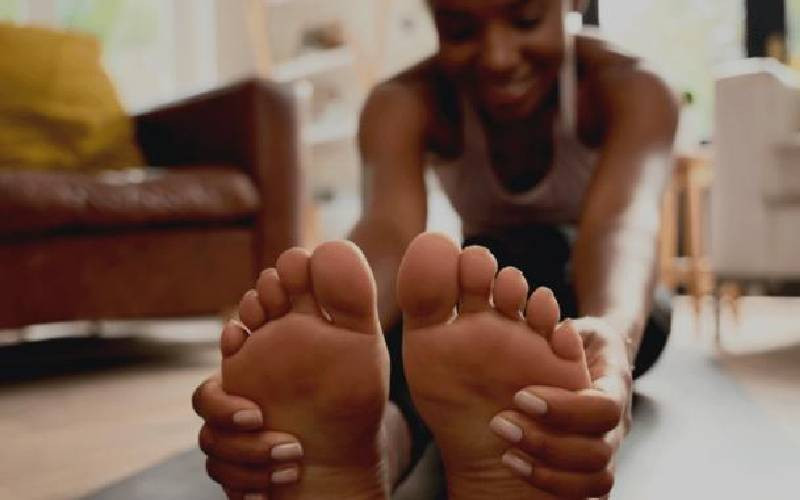
Taking off your shoes at the end of a long day feels great. But if you suffer from foot odour, it is not a pleasant experience, especially for those around you.
Foot odour is embarrassing and uncomfortable for many who suffer from stinky feet. Having smelly feet can make you wonder what's causing it and if it's a sign of an underlying health issue.
"You will always be too self-conscious. It consumes you psychologically and emotionally and lowers your self-esteem," says Maurice Muthoni.
Bromhidrosis or smelly feet, is a very common medical condition. It's due to a buildup of sweat, which results in bacteria growth on the skin. These bacteria cause bad odours.
Science of odour
Your feet produce a lot of sweat. They have more sweat glands than any other part of the body. Your feet have about 250,000 sweat glands. That's more sweat glands per square inch than any other area of the body. These glands release sweat all throughout the day to help cool your body and keep your skin moist.
However, severe sweating and foot odour in every season, not just when it's hot, could be a sign of hyperhidrosis. Hyperhidrosis is excessive sweating even if you aren't overheated. It may cause sweaty, smelly feet.
"Hyperhidrosis and bromhidrosis are two common conditions, which are troublesome for patients and carry a significant psychosocial burden," says Dr Njenga Winnie, a consultant dermatologist.
Naturally, there are some bacteria on the feet. These bacteria help break down sweat on the feet. If bacteria and sweat build up, a foul odour can form. Extra bacteria tend to form when a person sweats in their shoes, takes them off, and then puts them back on without allowing them to fully dry.
If you are not cleaning your shoes or are not exposing them to proper sunlight to kill the bacteria, then they can smell foul. So when you wear them, your feet will also absorb this stink and end up smelling.
Daily attention
"One can have sweaty feet and not necessarily have smelly feet. It narrows down to one's hygiene," Dr Njenga Winnie says.
"Poor hygiene can also play a role in causing bromhidrosis. Infrequent foot washing or not changing your socks at least once a day can allow extra bacteria to begin to grow on your feet," adds Dr Njenga Winnie.
Experts agree that with daily attention one should be able to reduce or eliminate foot odour within a week.
"Home treatments are usually effective, like soaking your feet in salt lukewarm water after thoroughly washing them with soap, but in severe cases, your doctor can prescribe stronger treatments," said Dr Njenga Winnie.
Here's how to reduce consistent foot odour:
Staving off foot odour starts with good hygiene: Wash your feet with mild soap and lukewarm water at least once a day. Dry them thoroughly, and remove all moisture between your toes with a disposable towel to reduce the risk of bacterial buildup.
Keep your toenails short and clean: Moisturise, wait for your feet to dry up then put on clean socks.
Wear clean breathable moisture-wicking socks every day: Wearing the same pair of shoes every day may not give them enough time to dry out, so alternate them.
Going barefoot at home and sleeping without socks on may help reduce foot odour because sweat isn't held against your skin or trapped inside your shoes. Don't go barefoot outside though, because this could invite other bacteria to the skin of your feet.
Keeping a journal of sweating episodes: Log episodes of sweaty feet in a notebook and look for patterns. This can help to identify foods, situations, or emotions that trigger foot sweating. It is then possible to take steps to limit or avoid these triggers.
Using antifungal powders, an antifungal foot powder will help to keep feet dry and odour-free.
Applying antiperspirant: An antiperspirant deodorant is an easy-to-use remedy for sweaty feet. These products work by temporarily blocking the sweat glands.
Choosing the right shoes: Look for shoes made from a breathable fabric such as canvas or leather. Avoid patent or plastic shoes as they do not allow good airflow and may trap sweat inside the shoe. Check that the shoes are the correct size. Shoes that are too tight will crowd the toes and contribute to sweaty feet.
If the tips above do not reduce foot sweating and smelling, it may be best to seek medical advice. A podiatrist can help you manage and treat hyperhidrosis and bromhidrosis.
 The Standard Group Plc is a multi-media organization with investments in media
platforms spanning newspaper print
operations, television, radio broadcasting, digital and online services. The
Standard Group is recognized as a
leading multi-media house in Kenya with a key influence in matters of national and
international interest.
The Standard Group Plc is a multi-media organization with investments in media
platforms spanning newspaper print
operations, television, radio broadcasting, digital and online services. The
Standard Group is recognized as a
leading multi-media house in Kenya with a key influence in matters of national and
international interest.
